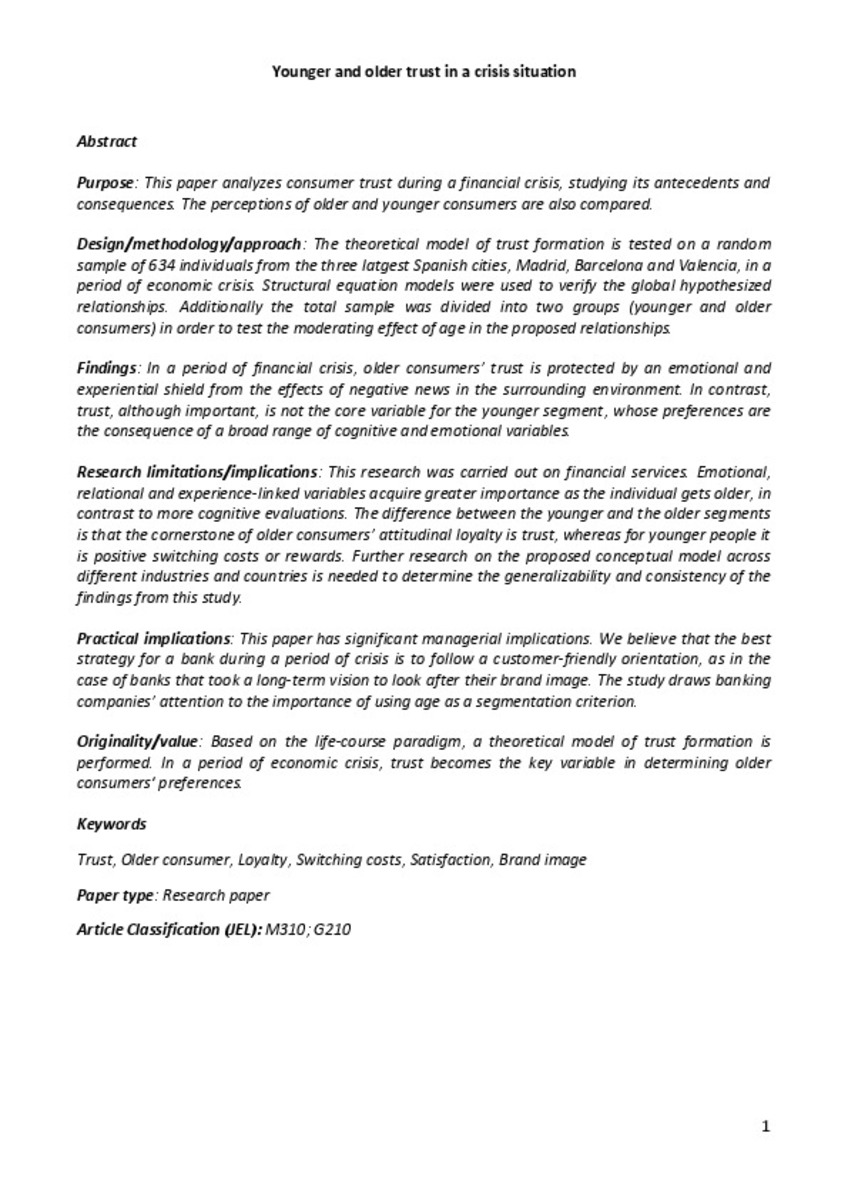| dc.contributor.author | Moliner, Miguel Angel | |
| dc.contributor.author | Fandos, Juan Carlos | |
| dc.contributor.author | Estrada, Marta | |
| dc.contributor.author | Monferrer Tirado, Diego | |
| dc.date.accessioned | 2018-07-04T11:43:13Z | |
| dc.date.available | 2018-07-04T11:43:13Z | |
| dc.date.issued | 2018 | |
| dc.identifier.citation | Miguel Angel Moliner-Tena, Juan Carlos Fandos-Roig, Marta Estrada-Guillén, Diego Monferrer-Tirado, (2018) "Younger and older trust in a crisis situation", International Journal of Bank Marketing, Vol. 36 Issue: 3, pp.456-481, https://doi.org/10.1108/IJBM-01-2017-0018 | ca_CA |
| dc.identifier.uri | http://hdl.handle.net/10234/175465 | |
| dc.description.abstract | Purpose
–
The purpose of this paper is to analyze consumer trust during a financial crisis, studying its
antecedents and consequences. The perceptions of older and younger consumers are also compared.
Design/methodology/approach
–
The theoretical model of trust formation is tested on a random sample of
634 individuals from the three largest Spanish cities, Madrid, Barcelona and Valencia, in a period of economic
crisis. Structural equation models were used to verify the global hypothesized relationships. Additionally,
the total sample was divided into two groups (younger and older consumers) in order to test the moderating
effect of age in the proposed relationships.
Findings
–
In a period of financial crisis, older consumers
’
trust is protected by an emotional and experiential
shield from the effects of negative news in the surrounding environment. In contrast, trust, although
important, is not the core variable for the younger segment, whose preferences are the consequence of a broad
range of cognitive and emotional variables.
Research limitations/implications
–
This research was carried out on financial services. Emotional,
relational and experience-linked variables acquire greater importance as the individual gets older, in contrast
to more cognitive evaluations. The difference between the younger and the older segments is that the
cornerstone of older consumers
’
attitudinal loyalty is trust, whereas for younger people, it is positive
switching costs or rewards. Further research on the proposed conceptual model across different industries
and countries is needed to determine the generalizability and consistency of the findings from this study.
Practical implications
–
This paper has significant managerial implications. The authors believe that the
best strategy for a bank during a period of crisis is to follow a customer-friendly orientation, as in the case of
banks that took a long-term vision to look after their brand image. The study draws banking companies
’
attention to the importance of using age as a segmentation criterion.
Originality/value
–
Based on the life-course paradigm, a theoretical model of trust formation is performed.
In a period of economic crisis, trust becomes the key variable in determining older consumers
’
preferences | ca_CA |
| dc.format.extent | 27 p. | ca_CA |
| dc.format.mimetype | application/pdf | ca_CA |
| dc.language.iso | eng | ca_CA |
| dc.publisher | Emerald | ca_CA |
| dc.rights | © Emerald Publishing Limited 2018. Licensed re-use rights only | ca_CA |
| dc.rights.uri | http://rightsstatements.org/vocab/InC/1.0/ | * |
| dc.subject | satisfaction | ca_CA |
| dc.subject | trust | ca_CA |
| dc.subject | rand image | ca_CA |
| dc.subject | customer loyalty | ca_CA |
| dc.subject | switching costs | ca_CA |
| dc.subject | older consumer | ca_CA |
| dc.title | Younger and older trust in a crisis situation | ca_CA |
| dc.type | info:eu-repo/semantics/article | ca_CA |
| dc.identifier.doi | https://doi.org/10.1108/IJBM-01-2017-0018 | |
| dc.rights.accessRights | info:eu-repo/semantics/openAccess | ca_CA |
| dc.relation.publisherVersion | https://www.emeraldinsight.com/doi/full/10.1108/IJBM-01-2017-0018 | ca_CA |
| dc.type.version | info:eu-repo/semantics/draft | ca_CA |







